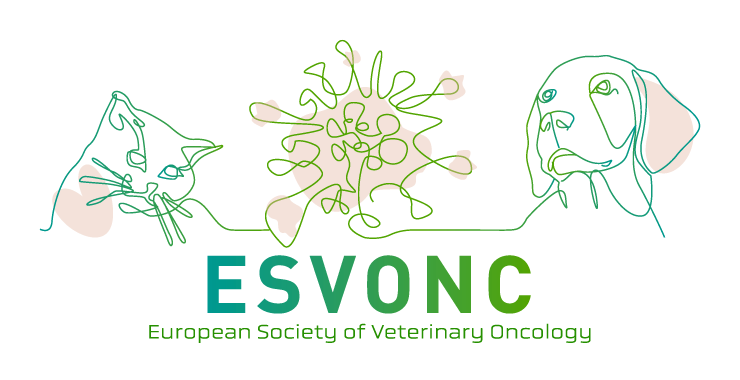Awards
The 2024 Award winners are:
Poster: Isabelle Ng ''Use of piroxicam suppositories in palliation of malignant epithelial rectal tumours in the dog: a case series''
Wim Misdorp Award: Caterina Ahrens ''Radiation therapy on macroscopic thyroid tumors: a retrospective study''
The 2023 Award winners are:
Katherine Boyd “Retrospective analysis investigating the independence of histological and immunohistochemical prognostic factors from 199 canine mast cell tumours with follow up from their primary care practices”
Carlotta Ahrens “Grading radiation toxicity after chemoradiotherapy of canine urinary tract carcinomas with VRTOG_v2.0”
At the annual ESVONC Congress 2 awards are granted:
Wim Misdorp Research Award for Junior ESVONC members
In addition to General Members’ Abstracts, Residents/Interns/Research Students can compete for the Wim Misdorp Award. The aim of this award is to recognize outstanding contributions to the knowledge related to pathogenesis, diagnosis, therapy, prevention, or control of animal tumour-diseases. It is given once yearly at the ESVONC Annual General Congress to a veterinarian based upon his/her written abstract and oral presentation of scientific data at the congress. In addition to a Certificate this award covers the travel, hotel and registration costs for the author to attend the ESVONC Congress up to €1000.
Rules:
• Presenting author competing for the award must also be the first author of the abstract
• Presenting author must be a Member of ESVONC
• The competing author must be present in order to win the award,
• Presenting author must hold a junior position (residency training, research programme or junior clinical post - if in doubt, ask!)
• Abstract and presentation must contain previously unpublished original work
• Abstract must be submitted timely and accepted by the ESVONC scientific committee
• Scientific work must meet good clinical practice and animal welfare criteria
The Wim Misdorp Award is awarded and sponsored by ESVONC.
In memory of Wim Misdorp
ESVONC Poster Award
The aim of this award is to recognize outstanding contributions to the knowledge related to pathogenesis, diagnosis, therapy, prevention, or control of animal tumour-diseases. It is given once yearly at the ESVONC Annual General Congress to a veterinarian based upon his/her written abstract and poster presentation of scientific data at the congress. In addition this award covers the travel and registration costs for the author to attend the ESVONC Congress up to €500.
Rules:
• Presenting author competing for the award must also be the first author of the abstract,
•Presenting author must be a Member of ESVONC,
•The competing author must be present in order to win the award,
•Presenting author must hold a junior position (residency training, research programme or junior clinical post - if in doubt ask!),
•Abstract and poster must contain previously unpublished original work,
•Abstract must be submitted timely and accepted by the ESVONC scientific committee,
•Scientific work must meet good clinical practice and animal welfare criteria
Award scoring and evaluation
The submissions (oral presentations and posters), eligible for the ESVONC Awards, are scored by the Awards Scoring Committee during the congress and during the oral presentations. The Awards Scoring Committee holds the right not to grant one or both awards or to change the prize.
The ESVONC awards are sponsored by ESVONC.
Former ESVONC Award winners
• Anaïs Prouteau (ESVONC congress Hofheim-am-Taunus - oral)
• Antonella Rigillo (ESVONC congress Hofheim-am-Taunus - poster)
• Pierre Boyé (ESVONC congress Gran Canaria - oral)
• Philip Schwarz (ESVONC congress Lyon - oral)
• Theresa Kreilmeier (ECVIM congress Gothenburg)
• Alexandra Keller (ESVONC congress Krakow - oral)
• Barbara Ruetgen (ESVONC congress Krakow - poster)
• Spela Bavcar (ESVONC congress Vienna - oral)
• Lorella Maniscalco (ESVONC congress Lisbon - oral)
